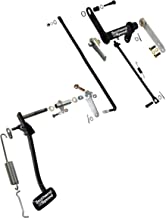If you’re like me, you probably want to know what Clutch Pedal Goes To Floor. If you’re having trouble with your car, then this is a fast fix that might just save you a trip to the mechanic. Have you ever experienced that strange sensation when your engine suddenly sputters and dies?
This is a frightening experience and one that could easily lead to an accident. I was driving down the street when I suddenly felt my clutch pedal go to the floor. I didn’t know what was happening, and I was starting to get nervous.
That is, fortunately, I was able to pull over safely and figure out what was going on. This kind of stuff happens all the time, but if you’re paying attention, you can usually figure out how to fix it before it becomes a real problem. When you have kids, you want to raise them up in the Lord’s will.
Your clutch pedal can go to the floor for many reasons, but we’ll tell you what they are and how to fix them. I’ve got some interesting facts for you. Read on to discover more.
Contents
Why does the clutch pedal go to floor?
If your clutch pedal has gone to the floor, it can be because there are a few reasons. The most common reason the clutch fails is that the hydraulic system that actuates it has a leak. The problem could be due to a leak in the master cylinder, the slave cylinder, a hose, or a line that connects them.
Clutch issues could be the result of a worn clutch cover, a defective pressure plate, or a worn-out throw-out bearing.
There are various reasons why the pedal goes to the floor; sometimes it could be a shifter problem, and other times it’s related to the linkage. If the clutch pedal goes to the floor, there are a few reasons. Most commonly, the clutch cable has been damaged, causing the pedal to release the engine when it’s not supposed to.
This is very common in older cars. It’s called “dry-clutching.” It occurs when the hydraulic clutch is dry and no fluid is circulating through it. If a pedal has problems, it may be due to issues with the hydraulic system.
A loose gas pedal is less common, but it can still happen. If you have a problem with your clutch pedal it’s best to bring it to a qualified mechanic for a check.
What are the consequences of a clutch pedal going to the floor?
If your clutch pedal goes to the floor, it means that there is a problem with your clutch system. This can have several consequences, including making it difficult or impossible to shift gears, making your car difficult to drive, and causing damage to your clutch system. If you notice that your clutch pedal is going to the floor, you should have it checked out by a mechanic as soon as possible.
How can I prevent my clutch pedal from going to the floor?
There are a few things you can do to prevent your clutch pedal from going to the floor. Make sure the fluid level in your clutch master cylinder is full. If it’s low, top it off and bleed the system according to the manufacturer’s instructions. Check for leaks in the system and repair them if necessary. If your pedal still feels spongy, have a mechanic take a look at it to see if there are any other issues.
What should I do if my clutch pedal goes to floor?
If your clutch pedal goes to the floor, there are a few things you can do to determine the cause:
- Check the level of your hydraulic fluid. If it is low, add more and check for leaks.
- If the fluid level is fine, check the pedal free play. There should be about an inch of free play at the top of the pedal travel.
- If there is too much or too little free play, adjust according to your car’s specifications.
- If the pedal free play is fine, have someone depress the pedal while you watch the clutch release fork. If the fork does not move or moves very little, there may be a problem with your clutch slave cylinder.
How do I know if my clutch pedal needs to be replaced?
The brake pedal has a firmer feel when it needs to be replaced. Additionally, if the car is pulling or drifting, this is an indication that the brake pedal needs to be replaced. When the transmission fluid level drops below the minimum level, there is an increased likelihood of transmission failure.
If the transmission fails, you will need to have it replaced before it can be fixed again. If the engine stalls, check your battery and then jump-start the car. If you still cannot get the car to start, contact your local Toyota dealer for assistance.
What are the symptoms of a failing clutch pedal?
If the clutch pedal goes all the way to the floor with little or no pressure, it may be a sign that the system is losing hydraulic pressure. This could be due to a leak in the system, a faulty master or slave cylinder, or worn-out seals. If the pedal feels spongy or soft, it may be a sign of air in the system.
Another symptom of a failing clutch pedal is vibration when depressing the pedal. if you notice any of these symptoms, have your vehicle inspected by a qualified technician.
How much does it cost to replace a clutch pedal?
If your clutch pedal goes to the floor, it will likely need to be replaced. The cost of this can vary depending on the make and model of your car, but it is typically between $200 and $500. The cost to repair a clutch can vary and may range between $500 to $2,500. It depends on the car.
How often should I have my clutch pedal checked?
It’s time to have your clutch pedal checked if you notice that your clutch pedal is going to the floor or you have difficulty shifting gears. Depending on how frequently you drive and the type of driving you do, you may need to have your clutch pedal checked every few months or so.
If you do a lot of stop-and-go driving, or heavy trailer towing, you might need to have it checked more often. Most people who have a problem with their clutch pedal are unaware of it until they have a hard time shifting into gear or the clutch pedal goes to the floor.
When this happens, you’ll notice that the cable that connects the clutch pedal to the transmission is loose. It will take you a while to find out that you have a loose cable. You can’t see it when you drive, and you won’t know it’s loose until you try to shift gears. What Causes Clutch Pedal Problems?

